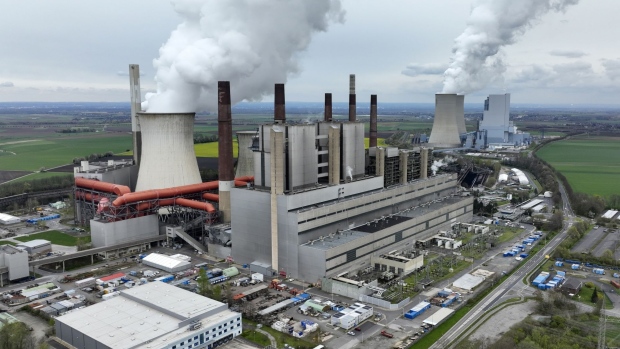Oct 4, 2022
German Utility to Extend Life of German Lignite Power Stations to Ease Energy Crisis
, Bloomberg News

(Bloomberg) -- RWE AG will bring forward its coal exit by eight years to 2030, after it extends operations at two German lignite-fired power units until the end of next winter to help ease Europe’s worst energy crisis for decades.
The company will not receive any government compensation for accelerating the coal exit unlike in previous negotiations, it said in a joint press conference with the Economy Ministry. In the short-term, operations at Neurath D and E will be extended until at least March 2024 to help ease Germany’s reliance on gas supplies.
“In the current crisis, we are contributing to security of supply in Germany by temporarily increasing the use of our lignite-fired power plants and are thus also helping to displace gas from electricity generation,” said Chief Executive Officer Markus Krebber. “At the same time, we are investing billions of euros to accelerate the energy transition and are ready to phase out lignite by 2030.”
Russia has gradually tightened its grip on Europe’s gas supply curbing flows in retaliation for sanctions over its war on Ukraine. Germany has been forced to rely more on polluting sources of energy, including coal, calling into question the nation’s climate goal to become carbon neutral by 2045, and to generate all electricity from renewable sources by 2035.
The government has the opportunity to decide on a further extension of coal until the end of March 2025, at the latest. That would need to be finalized next year.
The announcement comes just after the company was criticized by an activist investor, Benedikt Kormaier, for boosting investments in the US while Germany is facing one of the worst energy crises in history. On Monday, Krebber said a $6.8 billion deal to buy Consolidated Edison Inc.’s renewable assets in the US won’t mean investing at home in Europe.
Read More: RWE Lignite Plants to Return to Electricity Market in October
The agreement to bring forward the lignite phase-out to 2030 will mean staff reductions accelerating toward the end of the decade, said RWE in a statement. The amount of coal produced at the Garzweiler open cast mine “will be roughly halved”, and the third resettlement that was planned for some villages will no longer happen.
The decision will also mean savings of about 280 million tonnes of carbon that would be emitted, the company said.
Meanwhile, the decommissioning of Neurath D and E power plant units, which were scheduled to be taken off the grid at the end of this year, will be deferred to ensure that the available capacity in Germany is not further reduced, the company said. The plants have a total capacity of 1.2 gigawatts.
RWE said it would keep investing in renewables in Germany, but Krebber warned that there are bottlenecks that limit investments in Germany, including the availbility of land for renewables development, regulatory clarity for the hydrogen market and a bureaucratic approval procedures.
RWE plans to invest 15 billion euros ($14.8 billion) in offshore and onshore wind, solar, batteries, flexible backup capacities and hydrogen in Germany by 2030.
(Updates with more details on coal exit on fourth paragraph)
©2022 Bloomberg L.P.






